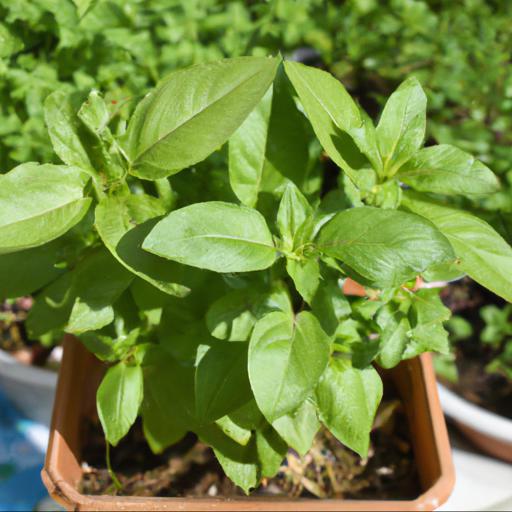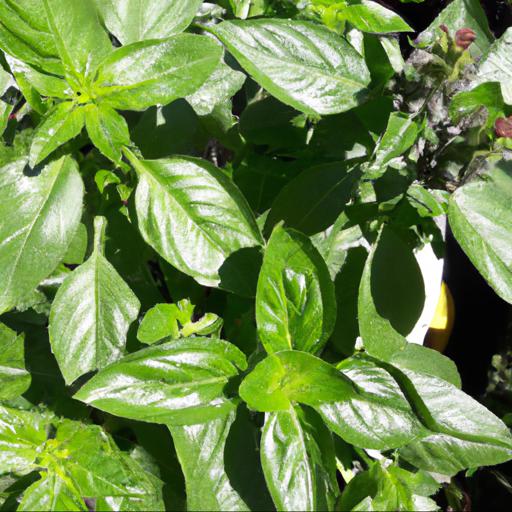Ocimum basilicum, commonly known as basil, is an aromatic herb that has been used for centuries in cooking and traditional medicine. The leaves of this plant have a strong, sweet aroma and a slightly peppery taste. Basil is a rich source of vitamins, minerals, and antioxidants and has been linked to various health benefits, including improved digestion, reduced inflammation, and better heart health.
Additionally, it can be used to add flavor to dishes, making it a popular ingredient in many cuisines around the world. In this blog, we’ll discuss the various health benefits of Ocimum basilicum and how you can incorporate it into your diet.
Health benefits of ocimum basilicum

The herb Ocimum basilicum, or sweet basil, is one of the most widely used and widely available herbs in UK gardens. As Ocimum basilicum is an important component of many regional cuisines, it is cultivated in British gardens to add extra flavor in cooking. Sweet basil is an annual herb native to the Mediterranean, but it has long been cultivated around the world and is a staple ingredient in many Mediterranean dishes.
Not only is Ocimum basilicum renowned for bringing delicious flavors and aromas to dishes, it is also known for its many health benefits. Consuming this herb has been associated with a wide range of health benefits including reducing symptoms of irritable bowel syndrome and sore throat, promoting healthy skin, and fighting inflammation and bacterial infections.
Ocimum basilicum contains a range of essential minerals, vitamins, and antioxidants that are beneficial for health and wellbeing. For UK gardeners, Ocimum basilicum is an easy herb to grow.
This herb requires plenty of direct sunlight, so ideally it should be grown in an area of the garden that faces the South or West. Sweet basil grows best in soil that is well-draining and slightly acidic, and it should be watered regularly in order to retain its moisture levels. The herb can be harvested for use in cooking when the leaves are still young and tender.
All that’s left to do is enjoy the delicious taste and health benefits of Ocimum basilicum!
Uses of ocimum basilicum

Ocimum basilicum, more commonly known as basil, is one of the most popular herbs for its use in various cooking applications. It is a fragrant, sweet-tasting herb that is loved by many for its aromatic flavor and valuable nutrient content.
Its scientific name, Ocimum basilicum, has Latin roots and translates as “excellent royal herb,” giving testament to its revered status as a culinary delight. Basil is often used in pasta dishes, salads, soups, stews, and sauces, making it a versatile addition to any kitchen. It contains a range of beneficial vitamins and minerals, such as vitamin A, vitamin B6, vitamin C, magnesium, iron, and potassium.
In addition, basil has antibacterial, antiviral and antifungal properties and can help strengthen the immune system, improve digestion, and protect the heart and brain. Basil is also used as an ornamental in gardening, prized for its delicate, glossy leaves and attractive flowers. While it can be grown in most climates, it does best in warm, sunny environments and adapts well to container gardens and vertical gardens.
Moreover, the plant’s fragrant foliage and pink or white flowers make it an ideal addition to many yards and gardens. Plant it near windows to take advantage of its pleasant fragrance and beautiful blooms.
In addition to its culinary and ornamental uses, basil is often used in traditional medicine. It’s known to relieve headaches, reduce fatigue, calm nerves, and improve concentration, making it a go-to remedy for many health issues.
Ocimum basilicum is also a common ingredient in herbal teas, providing a soothing and refreshing beverage. Overall, Ocimum basilicum is a valuable herb to have in the kitchen and garden. Its subtle flavor compliments many dishes while its fragrant aroma enriches any outdoor space.
Incorporating it into your home can offer countless benefits, both physical and emotional. Let the fantastic flavors and benefits of basil bring a little extra excitement to your cooking and flowering beds today!
Growing and caring for ocimum basilicum

Growers and carers of Ocimum basilicum, more commonly known as Basil, will tell you that one of the main pleasures of cultivating this hardy herb is its bounty of heady, sweet-smelling harvest. Indeed, the aroma of these luscious leaves tantalizes the senses, whether the leaf is crushed, diced, or even just flicked in the air.
Basil is one of the most versatile culinary herb to be grown in UK gardens, and with its attention-seeking, beguiling scent, makes it all the more desirable. The early stages of growing and caring for Basil can sometimes feel intimidating. However, with just a little bit of love and attention, any UK gardener can develop a Basil plant that will thrive in their outdoor landscape.
It doesn’t take anything special — just regular watering, plenty of sunshine, and occasional pruning will do the trick. Choosing the right soil is essential, too. Basil prefers a well-draining soil, with plenty of nutrients like compost and mulch.
This will help Basil grow up to its full potential. As for harvesting Basil for the home cook, the best time to do so is when the plant is still relatively small.
A few leaves snipped here and there won’t hurt the plant and it won’t prematurely deplete its resources. Remember to avoid taking leaf shoots closest to the base of the stem — these are vital for the plant to grow. If you notice any leaves getting yellowed, crisped or soggy, it’s time to harvest them as soon as possible.
This will help encourage new, fresh leaves to take their place and maintain a healthy Basil plant. Enjoy!
Recipes using ocimum basilicum
:As a UK garden expert, I can tell you the many uses of Ocimum basilicum, commonly known as basil. This perennial herb is a popular ingredient in many classic Italian recipes, particularly tomato based pasta dishes, as well as being a great addition to salads, sandwiches and soups. It has a sweet, yet slightly peppery flavor which makes it suitable for many uses, both sweet and savory.
Ocimum basilicum can be used both as a fresh topping or as an ingredient in many recipes. It can be enjoyed raw, either fresh or dried, or cooked into many dishes.
For example, it can be used to top off a bruschetta dish with a burst of flavor, or added to a homemade pesto to add a vibrant flavor. Combined with olive oil, nuts and cheese, the basil adds a rich depth to pesto, or it can be blended with olive oil and garlic for a savory marinade.
Basil can also be used as a rub for grilled meats, particularly chicken or fish, adding savory robustness to the dish. It can also be used in marinated vegetable dishes or even in desserts to give added flavor or a unique twist to a recipe. Utilizing basil in a variety of recipes is a great way to bring out the best flavors in any dish.
Overall, basil is a versatile and flavorful herb suitable for many uses, from a simple garnish to an ingredient in recipes. As an UK garden expert, I can recommend basil as a great addition to any garden and as an ingredient in your favorite dishes.
With its sweet yet slightly peppery flavor, it can be used in any recipe, helping to add flavor and variety.
Our video recommendation
Final Touch
Ocimum basilicum, commonly known as Basil, is a herb widely used in cooking and medicine. It is a tender plant, native to tropical and subtropical regions of the world, and is an important culinary and medicinal herb. Basil is packed with antioxidants and has anti-inflammatory properties, making it beneficial for treating a variety of ailments.
It is also known to boost the immune system, improve digestion and reduce stress. Basil is a versatile herb that can be used in a variety of dishes, and its health benefits make it a great addition to any diet.
FAQ
What are the health benefits of Ocimum basilicum?
The health benefits of Ocimum basilicum (basil) include improved digestion, relief from inflammation, improved immunity, and protection against certain cancers. It is also known to have antioxidant, antimicrobial, and anti-inflammatory properties.
What are the different varieties of Ocimum basilicum?
The different varieties of Ocimum basilicum include Genovese, Sweet Basil, Cinnamon Basil, Thai Basil, Purple Basil, and Lemon Basil.
How is Ocimum basilicum used in cooking?
Ocimum basilicum, commonly known as basil, is used in cooking as a seasoning herb. It is used to flavor a variety of dishes, including soups, salads, sauces, and pasta dishes. It is also used to make pesto and other sauces.
How can Ocimum basilicum be grown in the home garden?
Ocimum basilicum can be grown in the home garden by planting it in a sunny spot with well-draining soil, providing consistent moisture, and fertilizing it regularly.
What are the medicinal uses of Ocimum basilicum?
Ocimum basilicum, commonly known as basil, has a variety of medicinal uses. It has been used to treat digestive issues, headaches, anxiety, depression, and inflammation. It is also believed to have anti-bacterial and anti-fungal properties, making it useful for treating skin infections. In addition, basil is a natural source of antioxidants, which can help protect against cell damage and reduce the risk of certain diseases.
How can Ocimum basilicum be used to make herbal teas?
Ocimum basilicum can be used to make herbal teas by infusing the leaves in hot water for a few minutes. The tea can be sweetened with honey or other natural sweeteners.

